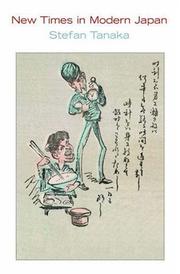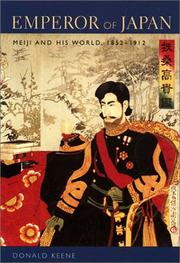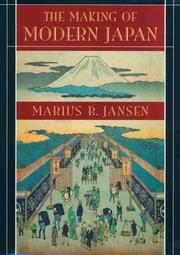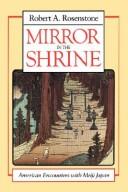| Listing 1 - 10 of 14 | << page >> |
Sort by
|
Book
ISBN: 0814785522 Year: 1988 Publisher: New York New York University press
Abstract | Keywords | Export | Availability | Bookmark
 Loading...
Loading...Choose an application
- Reference Manager
- EndNote
- RefWorks (Direct export to RefWorks)
Book

ISBN: 0691102457 140085430X 0691604843 0691054592 1306989795 0691633851 9780691604848 9781400854301 Year: 2014 Publisher: Princeton, NJ
Abstract | Keywords | Export | Availability | Bookmark
 Loading...
Loading...Choose an application
- Reference Manager
- EndNote
- RefWorks (Direct export to RefWorks)
In this book social scientists scrutinize the middle decades of the nineteenth century in Japan. That scrutiny is important and overdue, for the period from the 1850s to the 1880s has usually been treated in terms of politics and foreign relations. Yet those decades were also of pivotal importance in Japan's institutional modernization. As the Japanese entered the world order, they experienced a massive introduction of Western-style organizations. Sweeping reforms, without the class violence or the Utopian appeal of revolution, created the foundation for a modern society. The Meiji Restoration introduced a political transformation, but these chapters address the more gradual social transition.Originally published in 1986.The Princeton Legacy Library uses the latest print-on-demand technology to again make available previously out-of-print books from the distinguished backlist of Princeton University Press. These editions preserve the original texts of these important books while presenting them in durable paperback and hardcover editions. The goal of the Princeton Legacy Library is to vastly increase access to the rich scholarly heritage found in the thousands of books published by Princeton University Press since its founding in 1905.
Japan -- History -- 19th century. --- Japan -- History -- Meiji period, 1868-1912. --- Japan -- Social conditions -- 1868-. --- Japan --- History --- Social conditions --- J3367 --- J3371 --- Japan: History -- Kinsei, Edo period -- kaikoku and bakumatsu (1853-1867) --- Japan: History -- Kindai, modern -- Meiji period (1868-1912) --- Japon --- Histoire --- Conditions sociales --- Japon. Histoire. 1850-1880. --- Japan. Geschiedenis. 1850-1880. --- Social conditions. --- 1800-1912. --- Japan. --- SOCIAL SCIENCE / General.

ISBN: 9780691128016 0691117748 0691128014 9786612129575 1282129570 1400826241 9781400826247 Year: 2009 Publisher: Princeton, NJ
Abstract | Keywords | Export | Availability | Bookmark
 Loading...
Loading...Choose an application
- Reference Manager
- EndNote
- RefWorks (Direct export to RefWorks)
New Times in Modern Japan concerns the transformation of time--the reckoning of time--during Japan's Meiji period, specifically from around 1870 to 1900. Time literally changed as the archipelago synchronized with the Western imperialists' reckoning of time. The solar calendar and clock became standard timekeeping devices, and society adapted to the abstractions inherent in modern notions of time. This set off a cascade of changes that completely reconfigured how humans interacted with each other and with their environment--a process whose analysis carries implications for other non-Western societies as well. By examining topics ranging from geology, ghosts, childhood, art history, and architecture to nature as a whole, Stefan Tanaka explores how changing conceptions of time destabilized inherited knowledge and practices and ultimately facilitated the reconfiguration of the archipelago's heterogeneous communities into the liberal-capitalist nation-state, Japan. However, this revolutionary transformation--where, in the words of Lewis Mumford, "the clock, not the steam engine," is the key mechanism of the industrial age--has received little more than a footnote in the history of Japan. This book's innovative focus on time not only shifts attention away from debates about the failure (or success) of "modernization" toward how individuals interact with the overlay of abstract concepts upon their lives; it also illuminates the roles of history as discourse and as practice in this reconfiguration of society. In doing so, it will influence discussions about modernity well beyond the borders of Japan.
J3371 --- Japan: History -- Kindai, modern -- Meiji period (1868-1912) --- Japan -- History -- Meiji period, 1868-1912. --- Japan -- History. --- East Asia --- Regions & Countries - Asia & the Middle East --- History & Archaeology --- Japan --- History --- J4000.70 --- Japan: Social history, history of civilization -- Kindai (1850s- ), bakumatsu, Meiji, Taishō --- HISTORY / Asia / Japan.
Book
ISBN: 9784866580722 4866580720 Year: 2020 Publisher: Tokyo : Japan Publishing Industry Foundation for Culture (JPIC),
Abstract | Keywords | Export | Availability | Bookmark
 Loading...
Loading...Choose an application
- Reference Manager
- EndNote
- RefWorks (Direct export to RefWorks)
"Exploring the life of Komura Jutaro, a defining force in the fate of Japan as a developing power, this critical biography casts the history of Japanese modernization in a captivating light. After the Meiji Restoration, the Sino-Japanese War, and the Russo-Japanese War, Japan found itself occupying a prominent position in the global arena. Komura Jutaro, whom Mutsu Munemitsu had chosen as his successor, served on the Katsura Taro cabinet and set to forging a plan for Japan's continental development in opposition to Russia, considering the influence of the United States and Britain. Komura accurately judged that Japan had no other option than war with Russia, given his piercing insights into Russia's intentions, and that recognition enabled the Empire of Japan to stay on the right track. All the other merits and demerits of Komura's diplomacy are directly connected to the merits and demerits of the steps taken by the Empire of Japan that eventually led to the country's defeat in World War II. Komura's diplomacy thus calls into question Japan's national strategy itself: consistently pursuing independent diplomacy instead of entrusting Japan's fate to collaboration with the Anglo-American world and, in Asia, expanding Japan's exclusive sphere of influence beyond the Korean Peninsula deep into the Asian continent. The book does not intend to uncover or delve deeper into new historical facts in the scope of modern history. Rather, its chief aim is to lay out a historical picture that situates the relative importance of objective facts in proper balance."--Dust jacket. Exploring the life of Komura Jutaro, a defining force in the fate of Japan as a developing power, this critical biography casts the history of Japanese modernization in a captivating light. The book does not intend to uncover or delve deeper into new historical facts in the scope of modern history. Rather, its chief aim is to lay out a historical picture that situates the relative importance of objective facts in proper balance.
J3371 --- J2284.70 --- J4810.70 --- Japan: History -- Kindai, modern -- Meiji period (1868-1912) --- Japan: Genealogy and biography -- biographies -- kindai (1850s- ), bakumatsu, Meiji, Taishō --- Japan: International politics and law -- international relations, policy and security -- Kindai (1850s- ), bakumatsu, Meiji, Taishō --- Diplomats --- Foreign ministers --- Russo-Japanese War, 1904-1905. --- Komura, Jutarō, --- Japan --- Foreign relations.

ISBN: 023112340X 9780231123402 9780231123419 Year: 2002 Publisher: New York Columbia university press
Abstract | Keywords | Export | Availability | Bookmark
 Loading...
Loading...Choose an application
- Reference Manager
- EndNote
- RefWorks (Direct export to RefWorks)
Emperors --- Meiji, --- Japan --- History --- Emperors - Japan - Biography --- Meiji, - Emperor of Japan, - 1852-1912 --- Japan - History - Meiji period, 1868-1912 --- J3371 --- J4624 --- J4000.70 --- J4600.70 --- J2284.70 --- Japan: History -- Kindai, modern -- Meiji period (1868-1912) --- Japan: Politics and law -- state -- emperor --- Japan: Social history, history of civilization -- Kindai (1850s- ), bakumatsu, Meiji, Taishō --- Japan: Politics and law -- history -- Kindai (1850s- ), bakumatsu, Meiji, Taishō --- Japan: Genealogy and biography -- biographies -- kindai (1850s- ), bakumatsu, meiji, taishō --- Biography --- Meiji, Emperor of Japan 1852-1912 --- -J3371 --- al-Yābān --- Giappone --- Government of Japan --- Iapōnia --- I︠A︡ponii︠a︡ --- Japam --- Japani --- Japão --- Japon --- Japonia --- Japonsko --- Japonya --- Jih-pen --- Mư̄ang Yīpun --- Nihon --- Nihon-koku --- Nihonkoku --- Nippon --- Nippon-koku --- Nipponkoku --- Prathēt Yīpun --- Riben --- State of Japan --- Yābān --- Yapan --- Yīpun --- Zhāpān --- Япония --- اليابان --- يابان --- 日本 --- 日本国 --- -Emperors - Japan - Biography --- Jepun --- Yapon --- Yapon Ulus --- I︠A︡pon --- Япон --- I︠A︡pon Uls --- Япон Улс --- -Emperors --- Meiji --- History -
Book
ISBN: 9780674726703 0674726707 168417533X 9781684175338 Year: 2013 Publisher: Cambridge Harvard university Asia center
Abstract | Keywords | Export | Availability | Bookmark
 Loading...
Loading...Choose an application
- Reference Manager
- EndNote
- RefWorks (Direct export to RefWorks)
"In this volume, Wert traces the shifting portrayals of Restoration losers and the supporters who promoted their legacy. By highlighting the overlooked sites of memory and legends, Wert illustrates how the process of commemoration and rehabilitation allows individuals a voice in the formation of national history"--Provided by publisher.
Collective memory --- Oguri, Tadamasa, --- Ii, Naosuke, --- Japan --- Historiography --- History --- Historiography. --- J3000 --- J3367 --- J3371 --- Collective remembrance --- Common memory --- Cultural memory --- Emblematic memory --- Historical memory --- National memory --- Public memory --- Social memory --- Memory --- Social psychology --- Group identity --- National characteristics --- Japan: History -- historiography, theory, methodology and philosophy --- Japan: History -- Kinsei, Edo period -- kaikoku and bakumatsu (1853-1867) --- Japan: History -- Kindai, modern -- Meiji period (1868-1912) --- Oguri, Kōzuke no Suke, --- 小栗忠順, --- Ii Kamon-no-Kami Naosuké --- 井伊直弼 --- 伊井直弼

ISBN: 0674003349 0674009916 9780674009912 9780674003347 Year: 2002 Publisher: Cambridge, Mass. Belknap Press
Abstract | Keywords | Export | Availability | Bookmark
 Loading...
Loading...Choose an application
- Reference Manager
- EndNote
- RefWorks (Direct export to RefWorks)
Magisterial in vision, sweeping in scope, this monumental work presents a seamless account of Japanese society during the modern era, from 1600 to the present. A distillation of more than 50 years' engagement with Japan and its history, it is the crowning work of our leading interpreter of the modern Japanese experience. Since 1600 Japan has undergone three periods of wrenching social and institutional change, following the imposition of hegemonic order on feudal society by the Tokugawa shogun; the opening of Japan's ports by Commodore Perry; and defeat in World War II. "The Making of Modern Japan" charts these changes: the social engineering begun with the founding of the shogunate in 1600, the emergence of village and castle towns with consumer populations, and the diffusion of samurai values in the culture. Jansen covers the making of the modern state, the adaptation of Western models, growing international trade, the broadening opportunity in Japanese society with industrialization, and the postwar occupation reforms imposed by General MacArthur. Throughout, the book gives voice to the individuals and views that have shaped the actions and beliefs of the Japanese, with writers, artists and thinkers as well as political leaders given their due. The story this book tells, though marked by profound changes, is also one of remarkable consistency, in which continuities outweigh upheavals in the development of society, and successive waves of outside influence have only served to strengthen a sense of what is unique and native to Japanese experience. "The Making of Modern Japan" takes us to the core of this experience as it illuminates one of the contemporary world's most compelling transformations.
History of Asia --- anno 1600-1699 --- anno 1700-1799 --- anno 1800-1999 --- Japan --- J3360 --- J3371 --- Japan: History -- Kinsei, Edo, Tokugawa period, early modern (1600-1867) --- Japan: History -- Kindai, modern -- Meiji period (1868-1912) --- -JP / Japan - Japon --- Nihon --- Nippon --- Iapōnia --- Zhāpān --- I︠A︡ponii︠a︡ --- Yapan --- Japão --- Japam --- Mư̄ang Yīpun --- Prathēt Yīpun --- Yīpun --- Jih-pen --- Riben --- Government of Japan --- 92 --- JP / Japan - Japon --- Geschiedenis. --- Histoire. --- History. --- 92 Geschiedenis. --- 92 Histoire. --- 92 History. --- Geschiedenis --- History --- Japon --- Histoire --- Japan - History - Tokugawa period, 1600-1868 --- Japan - History - Meiji period, 1868-1912 --- 1600-1868 (Époque des Tokugawa) --- 1868-1912 (Ère Meiji)

ISBN: 0674576411 Year: 1988 Publisher: Cambridge Harvard university press
Abstract | Keywords | Export | Availability | Bookmark
 Loading...
Loading...Choose an application
- Reference Manager
- EndNote
- RefWorks (Direct export to RefWorks)
J3371 --- J3373.30 --- J4815.11 --- J4810.70 --- J2299.11 --- Americans --- -Yankees --- Ethnology --- Japan: History -- Kindai, modern -- Meiji period (1868-1912) --- Japan: History -- Kindai, modern -- Meiji period (1868-1912) -- modernization and innovation -- foreigners in Japan, o-yatoi --- Japan: International politics and law -- international relations, policy and security -- North America -- United States --- Japan: International politics and law -- international relations, policy and security -- Kindai (1850s- ), bakumatsu, Meiji, Taishō --- North America: Genealogy and biography of the United States --- Biography --- Griffis, William Elliot --- Morse, Edward Sylvester --- Hearn, Lafcadio --- -Homes and haunts --- -Japan --- Civilization --- -J3371 --- -Japan: History -- Kindai, modern -- Meiji period (1868-1912) --- -Americans --- Griffis, William Elliot, --- Hearn, Lafcadio, --- Morse, Edward Sylvester, --- Griffis, William Eliot, --- Kŭripʻisŭ, W. E., --- Griffis, W. E. --- Morse, E. S. --- Mōsu, Edowādo Shirubesutā, --- モース エドワードシルベスター, --- Morse, Edw. S. --- Koizumi, Yakumo, --- Hearn, Patrick Lafcadio, --- Hearn, Paddy, --- Hān, Rafukadio, --- Hsiao-chʻüan, Pa-yün, --- Ho-en, La-fu-kʻa-ti-wo, --- Ho, En, --- Hern, Lafcadio, --- Xiaoquan, Bayun, --- Chern, Leukadios, --- Hearn, Lafkadio, --- האירן, לאפקאדיא --- האירן, לאפקאדיא, --- ラフカディオ・ハーン, --- 小泉八云, --- 小泉八雲, --- Hern, Leukadios, --- Homes and haunts --- Japan --- 小泉八曇 --- Koizumi, Yakumo --- ハーン ラフカディオ --- ヘルン ラフカディオ --- モース, E.S. --- 小泉八雲
Book
ISBN: 2706818743 Year: 2005 Publisher: Paris Maisonneuve et Larose
Abstract | Keywords | Export | Availability | Bookmark
 Loading...
Loading...Choose an application
- Reference Manager
- EndNote
- RefWorks (Direct export to RefWorks)
Japan --- Civilization --- Foreign public opinion --- Western countries. --- J3371 --- J3373.30 --- J4000.70 --- J4129 --- Japan: History -- Kindai, modern -- Meiji period (1868-1912) --- Japan: History -- Kindai, modern -- Meiji period (1868-1912) -- modernization and innovation -- foreigners in Japan, o-yatoi --- Japan: Social history, history of civilization -- Kindai (1850s- ), bakumatsu, Meiji, Taishō --- Japan: Sociology and anthropology -- cross-cultural contacts, contrasts and globalization --- al-Yābān --- Giappone --- Government of Japan --- Iapōnia --- I︠A︡ponii︠a︡ --- Japam --- Japani --- Japão --- Japon --- Japonia --- Japonsko --- Japonya --- Jih-pen --- Mư̄ang Yīpun --- Nihon --- Nihon-koku --- Nihonkoku --- Nippon --- Nippon-koku --- Nipponkoku --- Prathēt Yīpun --- Riben --- State of Japan --- Yābān --- Yapan --- Yīpun --- Zhāpān --- Япония --- اليابان --- يابان --- 日本 --- 日本国 --- Jepun --- Yapon --- Yapon Ulus --- I︠A︡pon --- Япон --- I︠A︡pon Uls --- Япон Улс
Book
ISBN: 9784866581408 4866581409 Year: 2020 Publisher: Tokyo : Japan Publishing Industry Foundation for Culture,
Abstract | Keywords | Export | Availability | Bookmark
 Loading...
Loading...Choose an application
- Reference Manager
- EndNote
- RefWorks (Direct export to RefWorks)
Remnants of Days Past, by Kyoji Watanabe, is an epic journey into Japan’s past. It is a comprehensive look at the Tokugawa rule and the Edo period, an age in which the civilization of “Old Japan” was still on display and which, for better or worse, ceased to exist with the advent of modernization. Watanabe covers in great detail several topics pertaining to this civilization, including the status and position of the various social classes, views of women and children, attitudes towards sex, labor, and the body and religious beliefs, as well as the unique cosmology behind this civilization. Watanabe makes use of a number of works written by foreign observers who visited Japan from the end of the Edo period to the beginning of the Meiji to support his views. As the author writes in the book, “What is important in my mind is the reality that the civilization of ‘Old Japan’ developed through a universal desire, as well as the ideas behind this desire, to make it as comfortable as possible for human existence.” This is a massive work that takes an in-depth look at what modern Japan has lost.
Gaikokujin(Nihon zairyū). --- Nihon-Rekishi-Bakumatsuki. --- Nihon-Rekishi-Meiji jidai. --- Visitors, Foreign --- Japan --- Civilization --- J4000.70 --- J4000.60 --- J3367 --- J3371 --- Foreign visitors --- Foreigners --- Foreigners, Visiting --- International visitors --- Visiting foreigners --- Travelers --- Exchange of persons programs --- Japan: Social history, history of civilization -- Kindai (1850s- ), bakumatsu, Meiji, Taishō --- Japan: Social history, history of civilization -- Kinsei, Edo, Tokugawa period, early modern (1600-1867) --- Japan: History -- Kinsei, Edo period -- kaikoku and bakumatsu (1853-1867) --- Japan: History -- Kindai, modern -- Meiji period (1868-1912) --- al-Yābān --- Giappone --- Government of Japan --- Iapōnia --- I︠A︡ponii︠a︡ --- Japam --- Japani --- Japão --- Japon --- Japonia --- Japonsko --- Japonya --- Jih-pen --- Mư̄ang Yīpun --- Nihon --- Nihon-koku --- Nihonkoku --- Nippon --- Nippon-koku --- Nipponkoku --- Prathēt Yīpun --- Riben --- State of Japan --- Yābān --- Yapan --- Yīpun --- Zhāpān --- Япония --- اليابان --- يابان --- 日本 --- 日本国 --- Jepun --- Yapon --- Yapon Ulus --- I︠A︡pon --- Япон --- I︠A︡pon Uls --- Япон Улс
| Listing 1 - 10 of 14 | << page >> |
Sort by
|

 Search
Search Feedback
Feedback About UniCat
About UniCat  Help
Help News
News